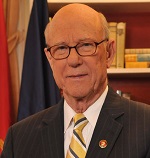More comments are coming forward about the recently released Scientific Report of the 2015 Dietary Guidelines Advisory Committee. Farm Bureau and some key politicians are not pleased about what they see as the committee’s overreach in the report that will be used for developing national nutrition policy by the federal government.
 Bob Stallman, President of the American Farm Bureau Federation says while his group is pleased by the science used in the report, some of the conclusions go beyond what the current committee members would qualify to comment on.
Bob Stallman, President of the American Farm Bureau Federation says while his group is pleased by the science used in the report, some of the conclusions go beyond what the current committee members would qualify to comment on.
“We are, however, concerned that the report’s lengthy foray into sustainability issues goes well beyond both the group’s expertise and its clearly defined mission. Its conclusions would have benefitted from the contributions of agronomists, animal scientists, ecologists and others with deeper expertise in agriculture and sustainability.
“The report makes many good observations about the need for a balanced diet, but we are troubled that it also repeats alarmist and unsubstantiated assertions about land use first promulgated by a UN agency with scant agricultural understanding. These assertions contradict the views of the UN’s own agricultural experts and fly in the face of decades of scientific consensus. The overall guidelines also ignore easier and more effective ways ordinary Americans can reduce their carbon footprints.”
Stallman goes on to say the report has an “unrealistically pessimistic view of sustainability,” and that colored its views regarding meat in the American diet.
U.S. Senator Pat Roberts, (R-Kansas), Chairman of the Senate Committee on Agriculture, Nutrition and Forestry, expressed similar concerns of the report’s contents.
 “This report is disappointing, as it is clear with some of these recommendations, the non-political, science-based process has gone awry. The Dietary Guidelines are an essential part of combating obesity and improving the diets of all Americans, and it is crucial the Guidelines be free from political influence and be completely based in nutrition science. It appears this has not been the case, and that is troubling news. As USDA and HHS take this report into consideration and develop the 2015 Dietary Guidelines for Americans, I hope they work to restore integrity to the process and preserve the independent, unbiased and nutrition science-based nature of previous Guidelines.”
“This report is disappointing, as it is clear with some of these recommendations, the non-political, science-based process has gone awry. The Dietary Guidelines are an essential part of combating obesity and improving the diets of all Americans, and it is crucial the Guidelines be free from political influence and be completely based in nutrition science. It appears this has not been the case, and that is troubling news. As USDA and HHS take this report into consideration and develop the 2015 Dietary Guidelines for Americans, I hope they work to restore integrity to the process and preserve the independent, unbiased and nutrition science-based nature of previous Guidelines.”
A public comment period on the report goes until April 8.
